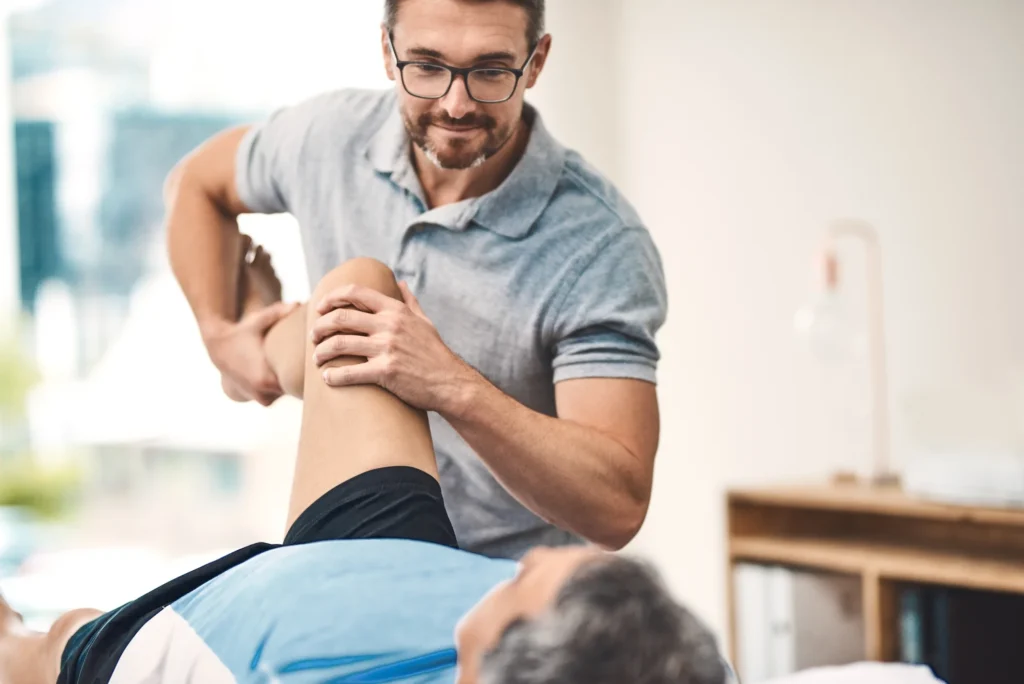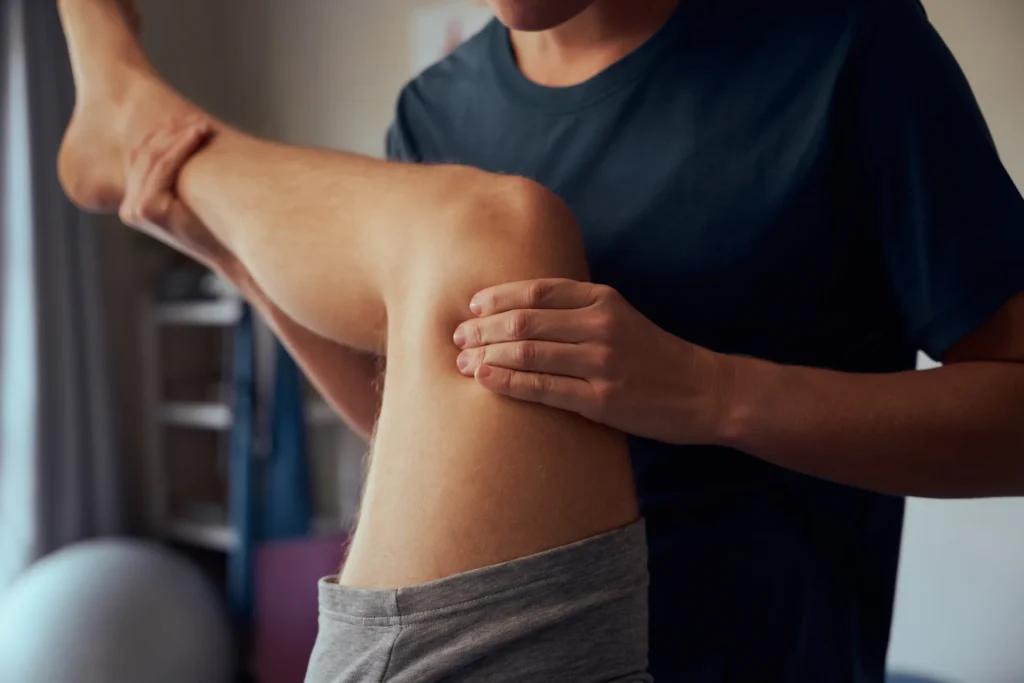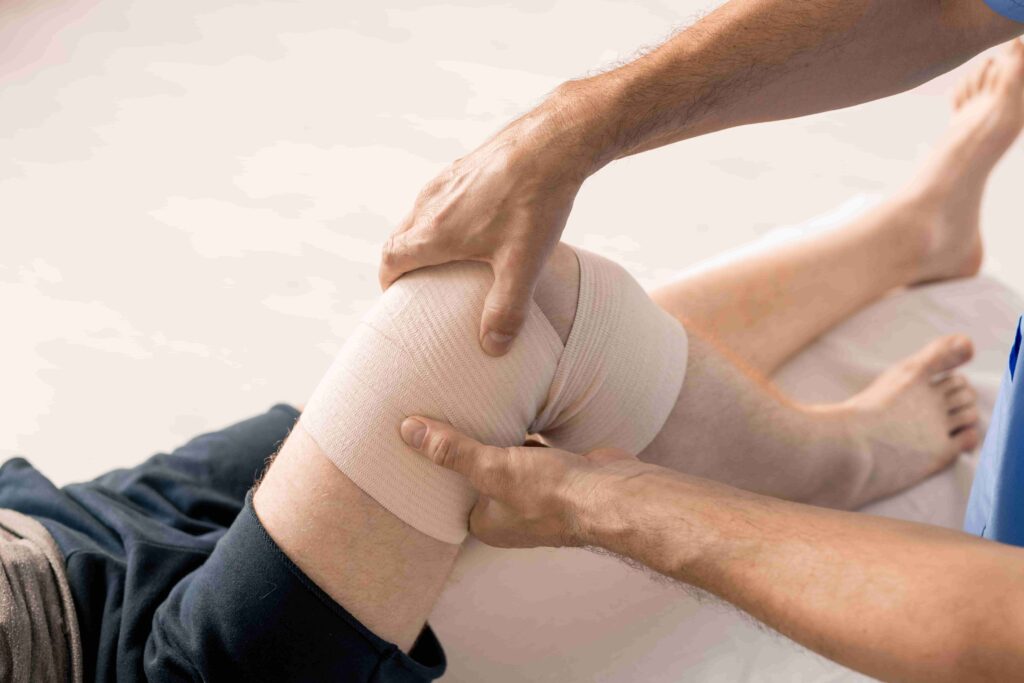Are You Struggling with Knee Pain That’s Preventing You from Going for Walks, Participating in Activities You Love, and Causing You to Worry About How Much Worse It Might Get?
We know you want to get back to doing the things you love. Playing with your kids, a simple trip to the shops, or a full night’s sleep. In order to do that, your knee pain has to become a thing of the past. The problem is, you’ve tried everything, one GP appointment after another, medication, rehab, and stress. The pain keeps coming back. It can make you feel like there is no other option but to live with it.
At our Huddersfield clinic, we believe that no one should live in pain. No one should feel failed by the healthcare system. We understand it seems like an impossible task, which is why our team of world-class knee pain physios work around the clock to ensure you get back to the pain-free life you deserve.
Our knee pain specialists in Huddersfield are equipped to handle a wide range of knee issues, including:

Patellofemoral Pain Syndrome (PFPS), often called “runner’s knee,” is a condition characterised by pain around or behind the kneecap (patella). It is typically caused by overuse, misalignment, or improper movement of the kneecap as it tracks over the femur (thigh bone) during physical activity. Symptoms include pain during activities like running, squatting, climbing stairs, or sitting for extended periods. PFPS is common in athletes and people with improper knee mechanics.
A meniscal tear is an injury to one of the two C-shaped cartilage discs that cushion and stabilise the knee joint. These tears usually occur during twisting motions of the knee, particularly during sports. Symptoms include pain, swelling, stiffness, and difficulty moving the knee or “locking” sensations. Meniscal tears are common in athletes but can also result from age-related wear and tear.
ACL (Anterior Cruciate Ligament) Injury: This involves a tear or sprain of the ACL, one of the key ligaments that stabilizes the knee. ACL injuries are common in sports involving sudden stops, jumps, or changes in direction, such as soccer or basketball. Symptoms include a popping sensation, immediate swelling, and instability of the knee. PCL (Posterior Cruciate Ligament) Injury: The PCL is another major ligament in the knee, located at the back of the joint. PCL injuries typically occur from a blow to the front of the knee or a fall onto a bent knee, often in car accidents or contact sports. PCL injuries are less common than ACL injuries and may result in pain, swelling, and difficulty bearing weight.
Osteoarthritis (OA) in the knee is a degenerative joint disease where the cartilage that cushions the bones in the knee joint gradually wears away. This results in pain, stiffness, swelling, and decreased range of motion in the knee. OA is often age-related but can also result from previous injuries.
IT Band Syndrome occurs when the iliotibial (IT) band, a thick band of connective tissue running along the outside of the thigh from the hip to the knee, becomes tight or inflamed. This can cause pain on the outer side of the knee, especially during activities like running, cycling, or walking downhill. The condition is often due to overuse, muscle imbalances, or improper biomechanics. IT Band Syndrome is common in runners and cyclists.
Schedule a convenient time for your initial visit using our online booking system or by giving us a call. Evening and Saturday appointments are available to suit your schedule.
You’ll have one-to-one appointments with an expert back pain physio at our Huddersfield clinic. From your first visit, we will establish the root cause of the problem, set your goals, and work together to get you there.
Receive immediate relief with our hands-on treatments. We’ll build your treatment plan around your lifestyle.
Continue your back pain treatment with our support and regular follow-up appointments, and any necessary adjustments to ensure lasting relief and a pain-free life.
We follow a proven system that allows us to get repeatable, predictable results for you by finding the true cause of your symptoms.









Physiotherapy can play a crucial role in reducing knee pain, improving function, and enhancing quality of life for individuals suffering from knee pain. It can be very beneficial for individuals who have undergone surgery and want to avoid further interventions.
There are many different types of knee pain, from arthritis pain, to acute injuries, and tendon problems such as ‘runners knee’. No matter what type of knee pain you present with, your therapist will help you identify the root cause and put a plan in place to get rid of the pain long term.
Exercise is beneficial for managing knee pain as it strengthens muscles, improves flexibility, and promotes better joint stability and function. Consulting with a physiotherapist can help develop a safe and effective exercise program to manage knee pain effectively.
In your first session your therapist will listen to your story, do a thorough assessment, and clearly explain the reason for your pain. Together, you will come up with a treatment plan to address the root cause. Each session the therapist will review your progress, provide manual therapy, and update your rehab plan as appropriate until you achieve your end goals.
About
Resources
Quick Links